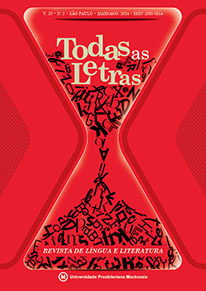Campo dêitico digital na construção de sentidos do texto.
Keywords:
deixis, digital deictic field, digital interactionsAbstract
This article aims to explore the universe of deixis and the creation of deixis fields, including the digital deixis field. Inspired by reflections initiated by Martins (2024) in his doctoral thesis, we examine how deixis manifests through semiotic systems beyond the verbal, such as imagery, gestures, and sound, in texts within the digital environment, and how this affects the co-construction of meaning. We intend to broaden this theoretical discussion to encompass other ways of constructing meaning in digital environments and reflect on the effects of social, discursive, and technological perspectives on Brazilian textual linguistics. We adopt Hanks' (2008) notion of deixis field, which combines the proposals of Bühler (1934) and Bourdieu (1981). For Bühler, the deixis field is demonstrative and serves as a guide for interlocutors in the enunciative scene, while the symbolic field is more conventional and representational. Bourdieu expands this view by relating the field to the broadening of the concept of communicative situation to include social, cultural, and discursive positions. We assume that deixis fields are constructed from multiple social roles that agents take on in interactions. Considering the interdisciplinary perspective, we relate the notion of deixis field to anthropology, sociology, and communication theory, seeking to understand how agents embody identities and social roles in texts. This allows us to analyze how sociocultural values emerge in interaction and become entwined in technodiscursive resources (Paveau, 2020). In Hanks' (2008) study, the deixis field involves the symbolic values of actions within communities of individuals. He redefines Bühler's immediate communicative situation view to consider the scenario as a stage for enactment. Thus, the deixis field is understood as an intersection between demonstrative and symbolic fields, anchored in social contexts and emerging in interactions. This expansion of the deixis field notion enables us to understand how agents construct meanings, negotiate referents, and assume social roles in textual interactions in the digital environment. Deixis is a phenomenon that encompasses a range of resources, such as ostensivity, demonstration, intersubjectivity, and origo establishment, all rooted in the social context from which they emerge, permeated by the values and beliefs that constitute them. In this context, we reflect on deixis and the deixis field, seeking to apply them to the digital environment, as suggested by Martins (2024). This implies considering the technological aspects that are essential for the production, reproduction, dissemination, and construction of meaning in native digital texts.
Downloads
References
BOURDIEU, P. Questões de sociologia. Tradução Fábio Creder. Petrópolis: Vozes, 2019 [1981].
BÜHLER, K. Sprachtheorie: Die Darstellungsfunktion der Sprache. Jena: Fischer,1934.
CAVALCANTE, M. M.; BRITO, M. A. P.; MARTINS, M. A. O funcionamento pré-
-discursivo e as estratégias textuais. Linha D’Água, São Paulo, v. 37, n. 01,
p. 68-85, jan./mar. 2024. Disponível em: https://www.revistas.usp.br/linha
dagua/article/view/213925/203262. Acesso em: 23 maio 2024.
CAVALCANTE, M. M. et al. O texto e suas propriedades: definindo perspectivas
para análise. Revista (Con)Textos Linguísticos, Vitória, v. 13, n. 25, p. 25-39, set.
Disponível em: http://periodicos.ufes.br/contextoslinguisticos/article/
view/27884/18764. Acesso em: 25 maio 2024.
CHARAUDEAU, P. Por uma interdisciplinaridade “focalizada” nas ciências humanas
e sociais. In: MACHADO, I.; COURA-SOBRINHO, J.; MENDES, E. (org.).
A transdisciplinaridade e a interdisciplinaridade em estudos da linguagem. Belo
Horizonte: Netii Fale, UFMG, 2013.
CHARAUDEAU, P. Linguagem e discurso: modos de organização. 2. ed. São Paulo:
Contexto, 2019.
ÉMÉRIT, L. La publication multisite: un objet linguistique qui interroge les notions de texte et de contexte dans les environnements numérique. Essais, v. 12, p. 173-190, 2017. DOI: https://doi.org/10.4000/essais.3026.
GOFFMAN, E. A representação do eu na vida cotidiana. 19. ed. Petrópolis: Vozes, 2013. 273 p.
HANKS, W. F. Língua como prática social: das relações entre língua, cultura e sociedade a partir de Bourdieu e Bakhtin. In: BENTES, A. C.; RESENDE, R. C.;
MACHADO, M. A. R. (org.). São Paulo: Cortez, 2008.
LEVINSON, S. C. Pragmatics. Cambridge: Cambridge University Press, 1983.
MARTINS, M. A. A caracterização dos tipos de dêixis como processos referenciais. 2019. Dissertação (Mestrado em Linguística) – Universidade Federal do Ceará, Fortaleza, 2019.
MARTINS, M. A. Redimensionando a noção de dêixis: o @ como recurso dêitico na tecnodiscursividade. Revista da Anpoll, v. 54, n. 1, e1897, 2023. Disponível em: https://revistadaanpoll.emnuvens.com.br/revista/article/download/1897/1388/7404. Acesso em: 13 jan. 2024.
MARTINS, M. A. Tecnotextualidade e campo dêitico digital: análise de aspectos interacionais e enunciativos. 2024. 163 p. Tese (Doutorado em Linguística) – Universidade Federal do Ceará, 2024.
MATOS, J. G. As redes referenciais na construção de notas jornalísticas. 2018. 259 p. Tese (Doutorado em Linguística) – Universidade Federal do Ceará, Fortaleza, 2018.
PAVEAU, M.-A. Os pré-discursos: sentido, memória, cognição. Tradução G. Costa, D. Massmann. Campinas: Pontes, 2013.
PAVEAU, M.-A. L’analyse du discours numérique. Dictionnaire des formes et des pratiques. Paris: Hermann Éditeurs, 2017.
RABATEL, A. Homo narrans: por uma abordagem enunciativa e interacionista da narrativa. Tradução Maria das Graças Soares Rodrigues, Luís Passeggi, João Gomes da Silva Neto; revisão técnica João Gomes da Silva Neto. São Paulo: Cortez, 2016. v. 2.
Downloads
Published
How to Cite
Issue
Section
License
Copyright (c) 2024 Mônica Magalhães Cavalcante, Mariza Angélica Paiva Brito, Mayara Martins

This work is licensed under a Creative Commons Attribution-NonCommercial 4.0 International License.
The originals accepted and published become property of Mackenzie Presbyterian University, being forbidden their total or partial reproduction without permission of the Editorial Board, except for study and research.




